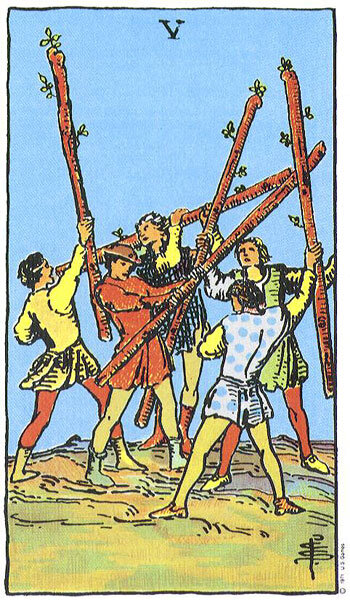Minor Arcana Midrash: Parashat Beshalach, the Five of Wands and Gevurah
/In this week’s Torah reading the Israelites find themselves facing the sea, with Pharaoh and his army at their backs. Despite witnessing the ten plagues/miracles that got them this far, the Israelites think they’re doomed. And they begin fighting among themselves, complaining, competing—kvetching. Discipline has yet to take hold. Discipline and Structure, qualities of Gevurah, are shown in their negative, shadow representations in the Five of Wands, which is one of the cards that corresponds to this Sephira.
I’m a child of the 60s, so when I first started studying Kabbalah, I had some issues with Gevurah. The constellation of concepts for Gevurah include Organization, Discipline, Structure, Judgement, Severity, Harshness, Constriction, Limitation, Awe and Fear. But the truth is, we need many of these qualities, and in this reading the Israelites need Structure and Discipline. And all people need Boundaries and Limits. We all need Discernment in Judgement. In fact, the parting of the sea in this parashat is an expression of Gevurah—creating a channel that enables the Israelites to pass. But let’s look at the card and see other ways it relates.
In the Five of Wands everyone has a wand—everyone wants to be the leader, so everyone is at cross-purposes, rebelling against the Discipline needed to reach the (metaphorical) Promised Land. When everyone wants to establish his own Structure, when everyone wants to lead, the result is chaos. Focus on the man on the left: he is not holding that wand in a gesture of attack. He looks as though he’s trying to get the attention of all the other people—he is standing in a position of leadership, yet those around him are too busy arguing among themselves to really see him or follow his direction. Their wands are all pointed in different directions. The image of the man on the left reminds me of so many paintings and filmic images of Moses standing at the edge of the sea, raising his rod to part the waters. And what was happening just before he parted those waters? The Hebrews were arguing and complaining, and not happy about his leadership:
“And they said to Moses, ‘Was it for want of graves in Egypt, that you have brought us to die in the wilderness? What have you done to us, taking us out of Egypt?
Is not this the very thing we told you in Egypt, saying, ‘Let us be, and we will serve the Egyptians, for it is better for us to serve the Egyptians, than to die in the wilderness?’”
Exodus 14:11-12
They’re barely out of Egypt and the people have forgotten the pain of their slavery. They’re fearful of the way forward and at cross-purposes, no longer united in moving towards a goal. I know these people, because whenever I make a decision to change in some way I hear the voices of my inner “stiff-necked” Israelites complaining and trying to change my direction.
Of course, I have an inner Moses (and in inner Pharaoh) too. And perhaps you recognize these voices from your own inner dialogue. Because we all have our inner Israelites, complaining and looking to backslide almost every step of the way.
Pixar brought this metaphor to life in their film Inside Out, where five emotions are vying for control of a young girl’s personality.
Of course, this lack of Structure in the parashat is not internal. It’s a picture of a social group that’s not very Organized. Recently I experienced this lack of Organization and Structure recently in a contentious community meeting where the facilitator was unable to “herd the cats.” He couldn’t bring Organization to the meeting or create a Structure where everyone could feel safe. There were no clear Rules. And almost everyone ignored the time Boundaries. The result was a meeting with no resolution, with people stating their own position and not hearing anyone else. The image of the Five of Wands captures this situation.
The negative expression of Gevurah can be expressed either in lack of Organization or in Organization that is Constricting.
The image in the Five of Wands can also be seen as a positive expression of Gevurah—rather than chaos, we could be looking at choreography. The figures could very well be Morris Dancers. Or participating in a barn raising. It could be the vigorous discussion that is needed before coming to a consensus. But in relation to this week’s Torah reading, I see the Israelites (both inner and outer) suffering from a lack of discipline and acting out of fear.
May we all learn to integrate the positive aspects of Gevurah into our lives, so that we can be a strong channel for Chesed in the world.

